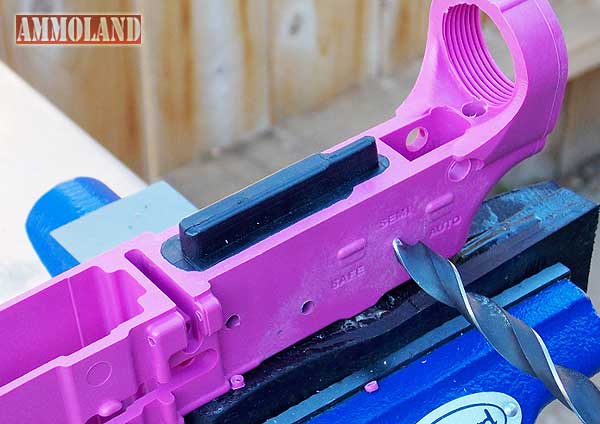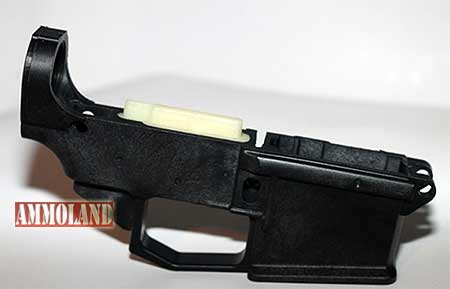ATF RUL. 2015-1 Establishes New Rules For Persons Who Machine Unfinished Frames/Receivers.


USA – -(Ammoland.com)- The New Year has brought new action from the Bureau of Alcohol, Tobacco, Firearms and Explosives (ATF), who published ATF Rul. 2015-1 on January 2, 2015.
In this new ruling, ATF reverses its longstanding position that persons who machine unfinished receivers on behalf of a customer are not required to have manufacturer’s licenses. The ruling can be found on ATF’s website here.
I. Background
The Gun Control Act of 1968 (GCA), 18 U.S.C. Chapter 44, requires persons who engage in the business of importing, manufacturing, or dealing in firearms to obtain a license from ATF. The term “manufacturer” is defined in 18 U.S.C. § 921(a)(10) as any person engaged in the business of manufacturing firearms or ammunition for purposes of sale or distribution. The term “dealer” is defined by 18 U.S.C. § 921(a)(11)(B) and in ATF’s regulations at 27 C.F.R. § 478.11 to include “any person engaged in the business of repairing firearms or of making or fitting special barrels, stocks, or trigger mechanisms to firearms…” This type of dealer is commonly referred to as a “gunsmith.” The marking requirements of the GCA apply to firearms imported by a licensed manufacturer or manufactured by a licensed manufacturer. 18 U.S.C. § 923(i). Firearms altered or manufactured by a licensed dealer/gunsmith are not subject to the marking requirements.
Prior to issuance of Rul. 2015-1, ATF took the position that persons who repair, alter, or manufacture firearms from parts supplied by a customer are not required to obtain a manufacturer’s license. ATF allowed such activities to be accomplished with a gunsmith/dealer license on the basis that there was no sale or distribution of the firearms that were altered or manufactured. This position is apparent in ATF Rul. 2009-1, addressing gunsmiths who camouflage or engrave firearms and do not need a manufacturer’s license; ATF Rul. 2009-2, addressing persons who install drop-in replacement part on firearms and do not require a manufacturer’s license; and ATF Rul. 2010-10, addressing gunsmiths who repair or alter firearms on behalf of licensed manufacturers or licensed importers.
The GCA does not prohibit the manufacture of a firearm by an unlicensed person for his or her personal use. ATF has long recognized this right, most recently in questions and answers on unfinished receivers posted on its website on October 23, 2014 (“Receiver Blanks Q&A’s”), see for example question 9. Firearms manufactured by an individual for personal use are not subject to the marking requirements of the law, and ATF has expressed concern over its inability to trace such firearms if they are recovered by Federal, State, or local law enforcement agencies. See questions 6 and 7 in the Receiver Blanks Q&A’s on ATF’s website.
II. ATF Rul. 2015-1
ATF Rul. 2015-1 reverses the agency’s longstanding position that gunsmiths may lawfully manufacture firearms on behalf of a customer without obtaining a manufacturer’s license and complying with the marking requirements of the GCA.
The ruling also holds that unlicensed machine shops conducting such activities must obtain a license as a manufacturer. ATF reaches this conclusion by interpreting the term “distribution” to include the act of returning a completed firearm to a customer. However, ATF concludes that a distribution occurs only in the situation where the gunsmith or machine shop starts with an unfinished receiver, machines it to the point where it is a frame or receiver that meets the GCA definition of “firearm,” then returns it to the customer. ATF distinguishes such a “distribution” from “traditional services” gunsmiths offer, typically repairing or improving firearms that are already complete weapons or capable of being assembled as such. Apparently these “traditional services” do not result in a distribution when the firearm is returned to the customer because the firearm has not been machined in a manner or otherwise created or made suitable for use as part of a weapon.
Basically, ATF interprets the statutory term “distribution” in two different ways depending on the alterations made to the unfinished receiver or firearm.
Significantly, the ruling comments that allowing licensed gunsmiths to perform manufacturing processes on a frame or receiver on behalf of an unlicensed person would lead to “an absurd result.” The so-called absurd result ATF describes is of firearms that “could be legally manufactured without any markings or serialization by dealer-gunsmiths who could avoid licensing as a manufacturer simply because his/her customer is unlicensed.” The ruling states that such activities run counter to a major purpose of the GCA because it eliminates the ability of law enforcement to trace crime guns.
The last portion of ATF Rul. 2015-1 specifically addresses the use of machining tools by unlicensed individuals. The ruling notes that Federal firearms licensees and unlicensed machine shops may make its machinery available to individuals who bring in raw materials, unfinished frames or receivers, and firearms parts for the purpose of making a functional firearm. The ruling holds that businesses may not avoid the licensing, marking, and record keeping requirements of the GCA by allowing unlicensed individuals to use its machinery to manufacture and assemble firearms. The ruling states that if the business controls access to and use of its machinery, tools, and equipment, then following manufacture of a firearm a “distribution” of the firearm occurs when the finished frame or receiver or complete weapon is disposed of to the customer. ATF states that the businesses would be “engaged in the business” of manufacturing, even though unlicensed individuals may have assisted them in the manufacturing process.

III. Impact of ATF Rul. 2015-1
ATF’s interpretation of the licensing and marking provisions of the GCA will require unlicensed machine shops and licensed gunsmiths who machine receivers on behalf of customers to obtain manufacturer’s licenses under the GCA. The ruling will also require that such firearms be marked, recorded in acquisition and disposition records, and transferred in accordance with the Brady law and all other provisions of the GCA. The ruling will also result in a requirement for newly licensed manufacturers to register as manufacturers under the Arms Export Control Act, as required by State Department regulations in Section 122.1 of the International Traffic in Arms Regulations (22 C.F.R. §122.1).
Current registration fees are at a minimum $2,250 per year, a significant sum particularly for small businesses. The combination of fees and government regulation may result in closing of businesses.
The ruling will have a significant impact on consumers who choose to manufacture their own firearms with the assistance of gunsmiths or unlicensed machine shops. Consumers rely on this method of firearms acquisition to save money and, in some cases, to avoid having their names recorded in FFL records that are available to the government.
Only consumers with the equipment and know-how to manufacture their firearms without assistance from others will be able to continue this practice.
IV. Conclusion
ATF Rul. 2015-1 reverses over 50 years of agency practice allowing the lawful manufacture of firearms by gunsmiths and machine shops on behalf of unlicensed consumers. ATF and the Department of Justice argue they are concerned about unmarked and untraceable firearms making their way into commercial channels. As valid a concern this may be, one cannot escape the fact that this “absurd result” has been going on without government intervention since before the GCA was enacted in 1968. Such a dramatic change in position without public input through the rulemaking process may indeed result in litigation and/or legislative action.
However, it is not yet certain whether we will see such action.
The above analysis is for informational purposes only and is not intended to be construed or used as legal advice. Receipt of this alert does not establish, in and of itself, an attorney-client relationship.
Questions about this alert can be directed to:
- Johanna Reeves: 202.715.9941 | jreeves@reevesdola.com
- Teresa Ficaretta: 202.715.9183 | tficaretta@reevesdola.com
About Reeves & Dola
Reeves & Dola is a Washington, DC law firm that specializes in helping clients navigate the highly regulated and complex world of manufacturing, sales and international trade of defense and commercial products. We have a deep understanding of the Federal regulatory process, and use our expertise in working with a variety of Federal agencies to assist our clients with their transactional and regulatory needs. www.reevesdola.com .
